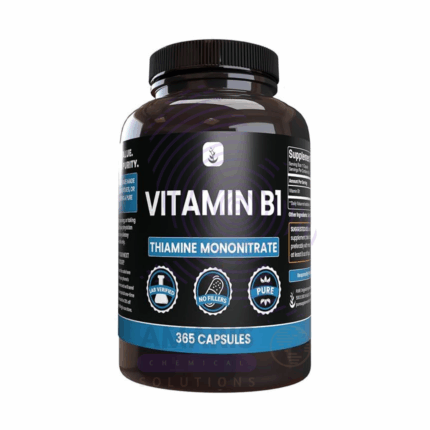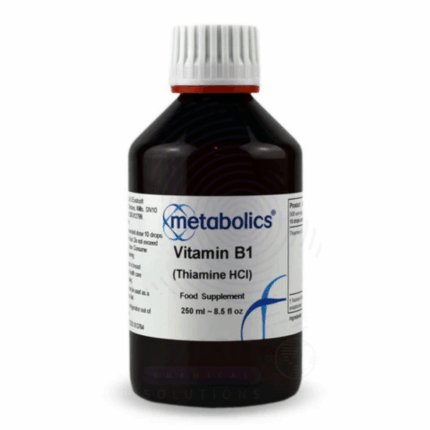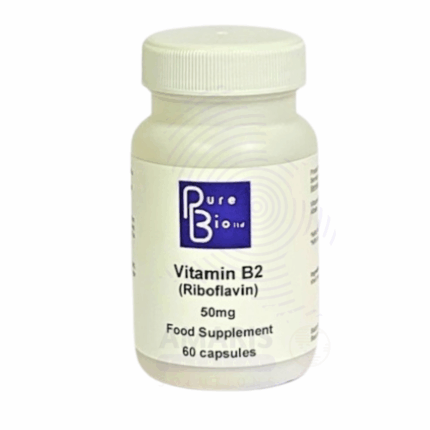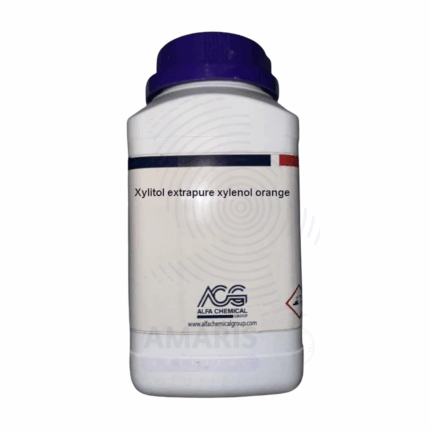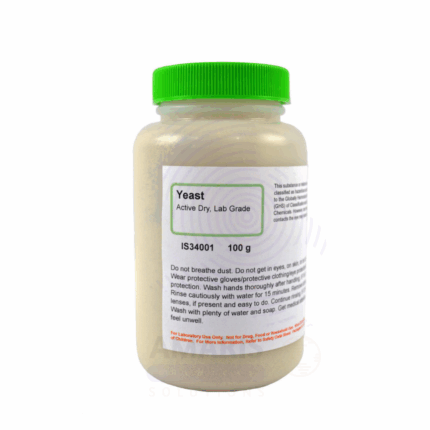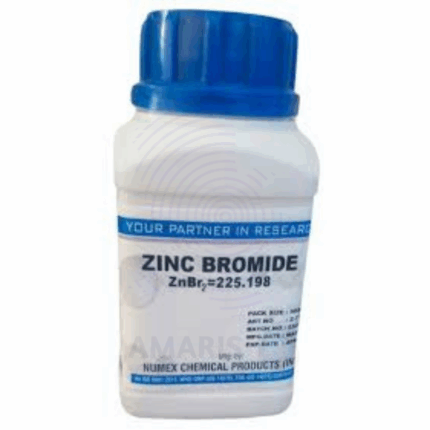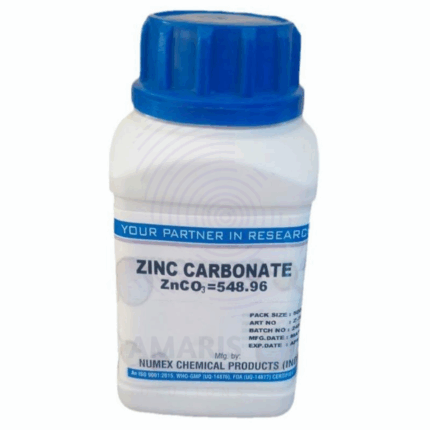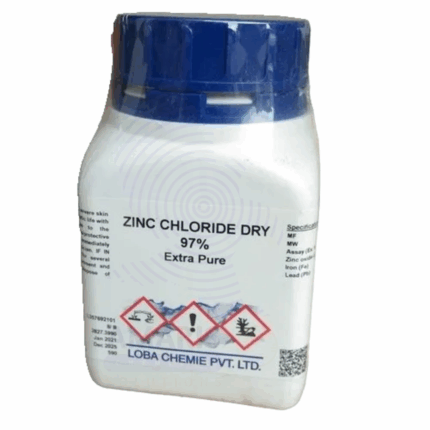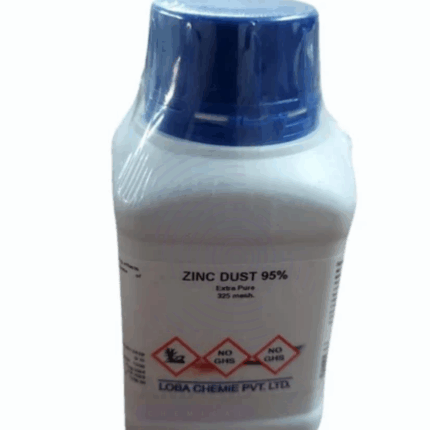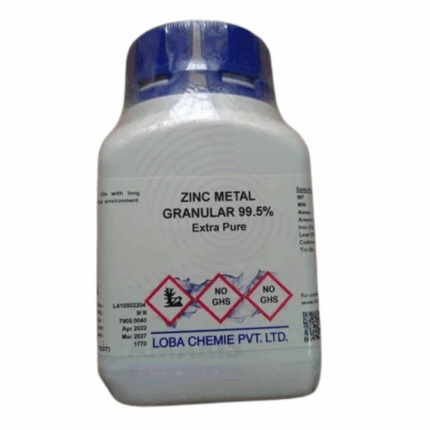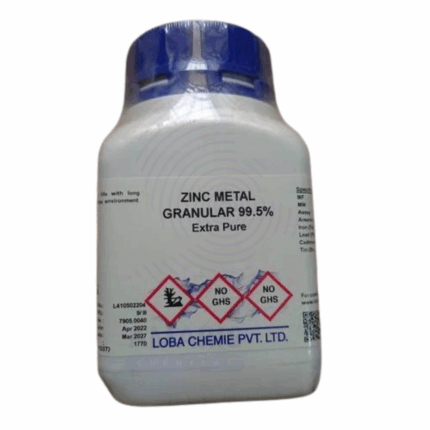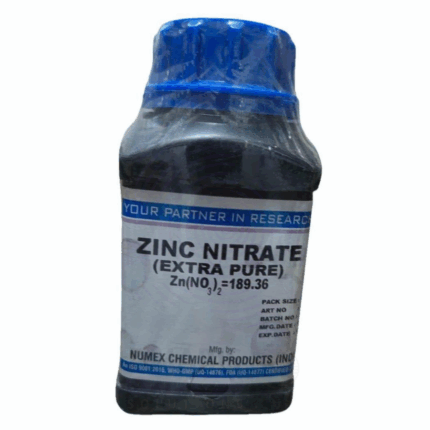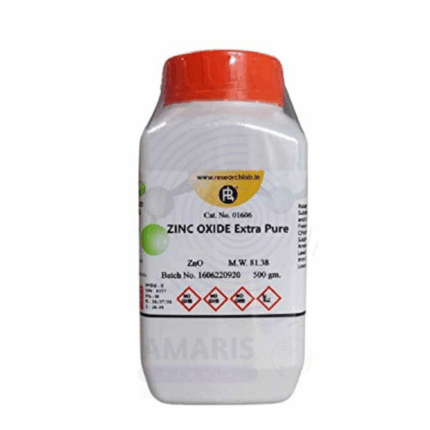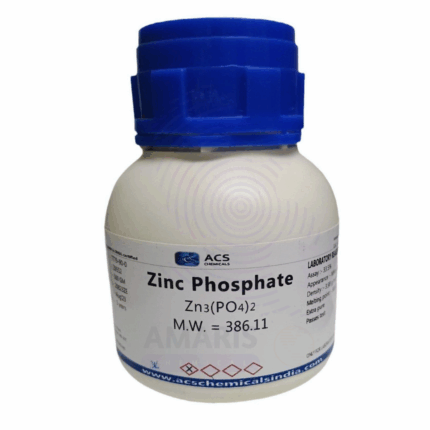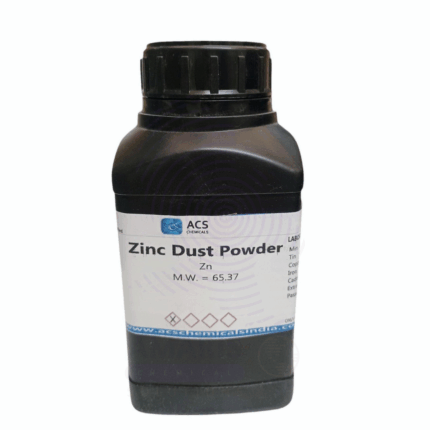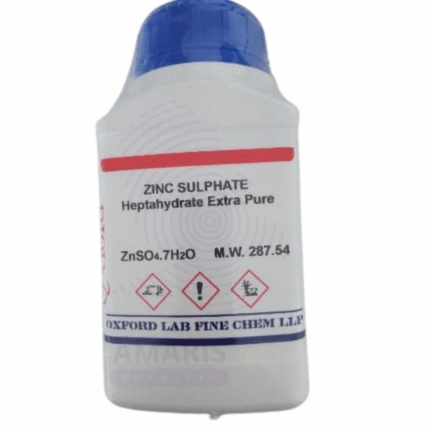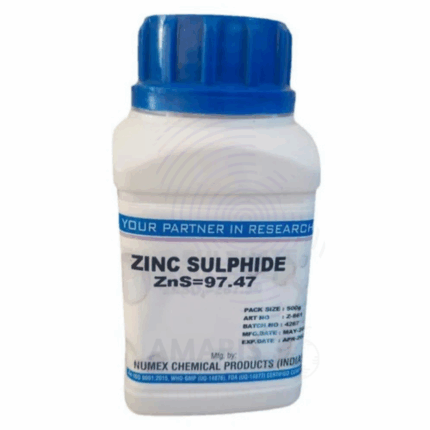
Vitamin A Palmitate
Vitamin A Palmitate is a highly concentrated, stable ester form of vitamin A used extensively in pharmaceuticals, nutraceuticals, cosmetics, and food fortification. This fat-soluble vitamin supports vision, immune function, skin health, and cellular growth. The palmitate ester enhances stability and shelf life, making it ideal for incorporation into powders, capsules, and topical formulations requiring precise dosing.
Vitamin B1 Mono Nitrate BP
Vitamin B1 Mononitrate BP is a stable, synthetic derivative of vitamin B1 (thiamine) used extensively in pharmaceutical, nutraceutical, and food fortification applications. It serves as an essential nutrient involved in carbohydrate metabolism and nervous system function. The mononitrate form offers enhanced stability and bioavailability compared to pure thiamine, making it ideal for inclusion in tablets, capsules, powders, and fortified food products.
Vitamin B1 Mono Nitrate Extra Pure
Vitamin B1 Mono Nitrate Extra Pure is a high-purity, white to pale yellow crystalline powder widely used as a vitamin B1 source in pharmaceutical, nutritional, and analytical applications. It is known for its enhanced chemical stability compared to thiamine hydrochloride and is commonly used in sustained-release supplements and fortified foods. This grade meets stringent purity requirements suitable for research, pharmaceutical formulation, and dietary supplementation. The compound is sensitive to moisture and should be stored in dry, cool, and dark conditions. Proper PPE is recommended during handling due to dust potential, though it is generally safe under normal conditions.
Vitamin B1 Thiamine HCL
Vitamin B1 Thiamine HCL is a water-soluble, stable salt form of vitamin B1 used widely in pharmaceuticals, nutraceuticals, and food fortification. It plays a critical role in energy metabolism by aiding carbohydrate breakdown and supports nervous system health. The hydrochloride form offers enhanced stability and solubility, making it suitable for oral supplements, injectables, and fortified foods.
Vitamin B12 Cyanocobalamin BP
Vitamin B12 Cyanocobalamin BP is a pharmaceutical-grade form of vitamin B12, standardized according to the British Pharmacopoeia (BP). It is an essential nutrient involved in red blood cell formation, neurological function, and DNA synthesis. This stable, synthetic cyanocobalamin is widely used in pharmaceuticals, nutraceuticals, and fortified foods to prevent and treat vitamin B12 deficiency.
Vitamin B12 USP32
Product Description
Vitamin B12 USP32 is a pharmaceutical-grade, water-soluble vitamin essential for red blood cell formation, neurological function, and DNA synthesis. This product meets the United States Pharmacopeia (USP) 32 standards, ensuring high purity and quality suitable for pharmaceutical and nutraceutical applications. Vitamin B12 USP32 is commonly supplied as cyanocobalamin or hydroxocobalamin forms, used in injections, tablets, and fortified food products.
Vitamin B2 Riboflavin base
Vitamin B2 Riboflavin base, commonly known as Riboflavin Base, is a water-soluble vitamin essential for energy production, cellular function, and metabolism of fats, drugs, and steroids. It is a vital component of coenzymes flavin mononucleotide (FMN) and flavin adenine dinucleotide (FAD), which participate in numerous biological oxidation-reduction reactions. Riboflavin base is widely used in pharmaceuticals, food fortification, and dietary supplements.
Vitamin B3 Niacin
Vitamin B3 Niacin, also known as Niacin or Nicotinic Acid, is a water-soluble vitamin essential for energy metabolism and enzymatic reactions in the body. It plays a key role in the synthesis of coenzymes NAD and NADP, which are critical for cellular respiration and DNA repair. Niacin is widely used in pharmaceuticals, nutraceuticals, food fortification, and animal nutrition to prevent niacin deficiency and support overall health.
Vitamin B3 Nicotinamide
Vitamin B3 Nicotinamide, also known as Niacinamide, is a water-soluble amide form of vitamin B3. It plays a crucial role in cellular energy production and DNA repair by serving as a precursor for coenzymes NAD and NADP. Nicotinamide is preferred in many pharmaceutical and cosmetic applications due to its stability and lower side-effect profile compared to niacin. It is widely used in pharmaceuticals, nutraceuticals, cosmetics, and food fortification.
Vitamin B5 d-pantothenate
itamin B5 d-pantothenate, commonly referred to as D-Pantothenate, is the biologically active, water-soluble form of pantothenic acid. It is an essential nutrient involved in the synthesis of coenzyme A (CoA), critical for fatty acid metabolism and energy production. D-Pantothenate is used across pharmaceuticals, food, feed, cosmetics, and nutraceuticals due to its stability, bioavailability, and broad health benefits.
Vitamin B6 Pyridoxine HCL
Vitamin B6 Pyridoxine HCL, also known as Pyridoxine Hydrochloride, is a water-soluble form of vitamin B6 used extensively in the pharmaceutical, food, and feed industries. It is essential for protein metabolism, neurotransmitter synthesis, red blood cell formation, and immune function. As a stable and bioavailable form of B6, it is widely incorporated in dietary supplements, fortified foods, clinical nutrition, and animal feed.
Vitamin B7 Biotin
Vitamin B7 Biotin, also known as Biotin, is a water-soluble B-complex vitamin essential for various metabolic processes. It serves as a coenzyme for carboxylase enzymes involved in the metabolism of fatty acids, amino acids, and glucose. Biotin is vital for healthy skin, hair, nails, and nervous system function. It is widely used in the pharmaceutical, nutraceutical, food, cosmetic, and animal nutrition industries.
Vitamin D3 BP
Vitamin D3 BP, also known as Cholecalciferol, is a fat-soluble vitamin primarily responsible for regulating calcium and phosphate metabolism in the body. It is synthesized in the skin through sunlight exposure or obtained from dietary sources and supplements. The BP (British Pharmacopoeia) grade ensures pharmaceutical quality and purity. Vitamin D3 is used in a wide range of applications, including human and veterinary medicine, supplements, fortified foods, cosmetics, and animal nutrition.
Vitamin D3100,000 IU/GM
Vitamin D3 100,000 IU/gm, also known as High-Potency Cholecalciferol, is a concentrated form of Vitamin D3 commonly used in pharmaceutical formulations, fortified food products, animal feed, and dietary supplements. This form delivers 100,000 International Units (IU) of cholecalciferol per gram, ensuring efficient delivery of therapeutic or nutritional doses in small volumes. It is produced under stringent quality standards to ensure stability, potency, and safety.
Vitamin E Acetate DL-Alpha-Tocopheryl Acetate
Vitamin E Acetate DL-Alpha-Tocopheryl Acetate, chemically known as DL-Alpha-Tocopheryl Acetate, is a stable, synthetic form of Vitamin E used widely in pharmaceuticals, cosmetics, food fortification, and dietary supplements. As an esterified form of tocopherol, it offers superior oxidative stability, making it ideal for formulations requiring extended shelf life. It functions as a potent antioxidant, protecting cells from oxidative damage and supporting immune and skin health.
Vitamin E Acetate Oily
Vitamin E Acetate Oily, also known as DL-Alpha-Tocopheryl Acetate, is a synthetic, oil-soluble form of Vitamin E with high purity and exceptional oxidative stability. This viscous liquid is ideal for applications requiring direct incorporation into oil-based systems such as soft gel capsules, cosmetic formulations, and fortified edible oils. Its stability under processing and storage conditions makes it a preferred form of Vitamin E for nutritional, pharmaceutical, cosmetic, and food-grade applications.
Vitamin E Acetate Powder
Vitamin E Acetate Powder, also known as DL-Alpha-Tocopheryl Acetate Powder, is a dry, free-flowing, encapsulated form of Vitamin E, standardized to contain 50% of active DL-Alpha-Tocopheryl Acetate. It is designed for easy handling and uniform mixing in dry formulations and is ideal for use in nutritional supplements, fortified foods, and animal feed. The microencapsulation enhances stability against oxidation, heat, and light, ensuring long shelf life.
Xylene Extra Pure
Xylene Extra Pure is a high-purity aromatic hydrocarbon solvent, consisting mainly of the three isomers of dimethylbenzene. It is widely used in laboratories as a solvent and clearing agent due to its excellent ability to dissolve a variety of organic compounds. Its purity ensures minimal interference in sensitive analytical and histological procedures. Xylene is essential in sample preparation, chromatographic analysis, and synthesis applications. It requires careful handling due to its flammability and potential health hazards from inhalation and skin contact. Proper storage and protective measures are critical for safe use.
Xylitol Extra Pure
Xylitol Extra Pure is a high-purity sugar alcohol widely used as a low-calorie sweetener and pharmaceutical excipient. It is a white crystalline powder that is odorless and highly soluble in water. Due to its non-cariogenic and humectant properties, xylitol is extensively used in dental care products, cosmetics, and food formulations, especially sugar-free products. In laboratories, it serves as an analytical standard and stabilizer. Xylitol is non-toxic, biodegradable, and safe for various applications but should be handled with standard precautions to avoid dust inhalation. Proper storage in airtight containers protects it from moisture absorption and degradation.
Yeast Active Dry Extra Pure
Yeast Active Dry Extra Pure is a high-quality, dry granulated form of Saccharomyces cerevisiae, widely used as a biological reagent in microbiological, biochemical, and fermentation research. Its consistent purity and viability make it ideal for laboratory studies involving fermentation, enzymatic activity, genetic research, and bioprocessing. It is also a key component in pharmaceutical and biotechnological applications, supporting recombinant protein production and probiotic development. The dry, stable form allows for easy storage and precise dosing. Proper handling is important to avoid moisture contamination and dust inhalation.
Zinc Bromide Extra Pure
Zinc Bromide Extra Pure is a high-purity inorganic compound with the formula ZnBr₂, appearing as a white to off-white crystalline solid. It is highly soluble in water, making it valuable in laboratory and industrial chemical processes requiring both zinc and bromide ions. This compound is widely used in analytical chemistry, organic synthesis, and as a high-density material for industrial applications such as drilling fluids and radiation shielding. Its Extra Pure grade guarantees minimal impurities, ensuring reproducibility and accuracy in research and formulation. Zinc Bromide is stable under normal conditions but requires careful handling due to its potential to cause irritation and its toxicity in aquatic environments. Proper storage involves protection from moisture and incompatible chemicals, with safety measures emphasizing PPE and environmental precautions.
Zinc Carbonate Extra Pure
Zinc Carbonate Extra Pure is a high-purity white, odorless powder or granular solid with the formula ZnCO₃. It serves as an essential inorganic compound widely used in analytical laboratories, pharmaceutical, cosmetic, and agricultural industries. Its insolubility in water and decomposition at moderate heat make it useful as a precursor to zinc oxide and other zinc-based chemicals. In laboratory applications, it functions as a reagent and buffer agent, while in pharmaceutical and cosmetic fields, it is valued for its mild antiseptic and astringent properties. Environmentally, it is considered low toxicity and stable, provided it is handled correctly and kept away from acids and moisture. Proper storage and safety precautions are vital to maintain its purity and effectiveness.
Zinc Chloride Extra Pure
Zinc Chloride Extra Pure is a highly pure, white crystalline or granular inorganic compound with formula ZnCl₂. It is a powerful Lewis acid and widely utilized in laboratories as a reagent, catalyst, and analytical standard. Due to its high solubility and acidity in water, it serves important roles in chemical synthesis, textile processing, and metallurgical fluxes. In pharmaceuticals and cosmetics, it is valued for its antiseptic and astringent properties. Industrially, Zinc Chloride is employed in water treatment, adhesives, and coatings. Because of its corrosive nature and reactivity with moisture, it requires careful handling and storage under dry conditions with appropriate personal protective equipment. Its environmental impact requires controlled disposal due to aquatic toxicity.
Zinc Hydroxide Extra Pure
Zinc Hydroxide Extra Pure is a high-purity, white, odorless powder used extensively in laboratory applications involving zinc chemistry. It acts as a key reagent in qualitative and quantitative analyses and the synthesis of zinc compounds. Insoluble in water but soluble in acids, it plays an important role in precipitation and buffering reactions. The Extra Pure grade ensures minimal impurities for sensitive experimental work. Zinc Hydroxide is also studied in pharmaceutical and environmental research for its bioactivity and water treatment potential. It requires careful handling to avoid dust inhalation and moisture exposure, and is stable under standard laboratory storage conditions.
Zinc Nitrate Extra Pure
Zinc Nitrate Extra Pure is a high-purity, colorless crystalline solid commonly found as the hexahydrate form. It is a vital reagent in analytical chemistry laboratories for zinc and nitrate ion determinations, calibration standards, and synthesis of zinc complexes. Its high water solubility and oxidizing properties make it useful in catalytic, materials science, and environmental chemistry research. The Extra Pure grade ensures minimal impurities, making it suitable for precise laboratory experiments. Careful handling is required due to its oxidizing nature and potential to release toxic nitrogen oxides upon decomposition. Storage in sealed containers away from reducing agents and moisture is essential to maintain quality and safety.
Zinc Oxide Extra Pure
Zinc Oxide Extra Pure is a high-purity, white, fine powder used extensively in laboratory, research, and pharmaceutical-grade formulations. Renowned for its amphoteric character, it reacts with both acids and bases, making it highly versatile in chemical synthesis and pH-related experiments. In laboratory research, it plays a key role in analytical chemistry, photocatalysis, pigment studies, and semiconducting material research. It is also valued in pharmaceutical and cosmetic R&D for its antimicrobial, UV-reflective, and healing properties. In environmental and materials science labs, Zinc Oxide is studied for its potential in pollutant degradation, corrosion resistance, and nanomaterial development. Its Extra Pure grade ensures suitability for applications demanding precise, consistent purity and low impurity levels. Although generally safe to handle, care should be taken to avoid inhaling fine dust or releasing large amounts into aquatic environments due to its toxicity to aquatic life.
Zinc Phosphate Extra Pure
Zinc Phosphate Extra Pure is a white, fine, odorless powder composed of trizinc diphosphate with high chemical stability and purity suitable for analytical and material science applications. It is widely used in laboratories for phosphate-based reactions, corrosion inhibition research, and dental material development. Known for its minimal solubility in water and compatibility with dilute acids, it serves as a stable phosphate source in various experiments. It is especially valued in lab-scale surface treatment simulations, pigment formulation testing, and environmental remediation trials. Zinc Phosphate’s inertness under standard conditions and non-toxic classification make it a preferred choice for controlled reactivity studies, inorganic synthesis, and coatings R&D. Proper handling is required due to its dusty nature, although it is considered non-hazardous under most regulatory frameworks.
Zinc Sulphide Extra Pure
Zinc Sulphide Extra Pure is a high-purity, white to pale yellow, odorless crystalline or powdery inorganic compound with the formula ZnS. It is widely used as a phosphorescent and luminescent material in laboratory and industrial applications. Known for its excellent optical properties, it serves as a key reagent in analytical chemistry for spectroscopic standards and as an activator in glass and ceramics. In pharmaceuticals and cosmetics, it acts as a UV blocker and luminescent agent.
Due to its inert nature and stability, Zinc Sulphide Extra Pure is ideal for use in paints, safety coatings, and electronic devices requiring phosphor materials. It requires careful handling to avoid dust inhalation and must be stored away from acids and moisture to prevent release of toxic hydrogen sulfide gas.


 Preservatives(food)
Preservatives(food) Flavor Enhancers
Flavor Enhancers Acidulants
Acidulants Sweeteners
Sweeteners Antioxidants
Antioxidants Colorants(food)
Colorants(food) Nutraceutical Ingredients (food)
Nutraceutical Ingredients (food) Nutrient Supplements
Nutrient Supplements Emulsifiers
Emulsifiers
 Collectors
Collectors Dust Suppressants
Dust Suppressants Explosives and Blasting Agents
Explosives and Blasting Agents Flocculants and Coagulants
Flocculants and Coagulants Frothers
Frothers Leaching Agents
Leaching Agents pH Modifiers
pH Modifiers Precious Metal Extraction Agents
Precious Metal Extraction Agents
 Antioxidants(plastic)
Antioxidants(plastic) Colorants (Pigments, Dyes)
Colorants (Pigments, Dyes) Fillers and Reinforcements
Fillers and Reinforcements Flame Retardants
Flame Retardants Monomers
Monomers Plasticizers
Plasticizers Polymerization Initiators
Polymerization Initiators Stabilizers (UV, Heat)
Stabilizers (UV, Heat)
 Antifoaming Agents
Antifoaming Agents Chelating Agents
Chelating Agents Coagulants and Flocculants
Coagulants and Flocculants Corrosion Inhibitors
Corrosion Inhibitors Disinfectants and Biocides
Disinfectants and Biocides Oxidizing Agents
Oxidizing Agents pH Adjusters
pH Adjusters Scale Inhibitors( water)
Scale Inhibitors( water)
 Antioxidants(cosmetic)
Antioxidants(cosmetic) Emollients
Emollients Fragrances and Essential Oils
Fragrances and Essential Oils Humectants
Humectants Preservatives
Preservatives Surfactants(cosmetic)
Surfactants(cosmetic) Thickeners
Thickeners UV Filters
UV Filters
 Fertilizers
Fertilizers Soil Conditioners
Soil Conditioners Plant Growth Regulators
Plant Growth Regulators Animal Feed Additives
Animal Feed Additives Biostimulants
Biostimulants Pesticides (Herbicides, Insecticides, Fungicides)
Pesticides (Herbicides, Insecticides, Fungicides)
 Active Pharmaceutical Ingredients (APIs)
Active Pharmaceutical Ingredients (APIs) Excipients
Excipients Solvents(pharmaceutical)
Solvents(pharmaceutical) Antibiotics
Antibiotics Antiseptics and Disinfectants
Antiseptics and Disinfectants Vaccine Adjuvants
Vaccine Adjuvants Nutraceutical Ingredients (pharmaceutical)
Nutraceutical Ingredients (pharmaceutical) Analgesics & Antipyretics
Analgesics & Antipyretics
 Analytical Reagents
Analytical Reagents Solvents(lab)
Solvents(lab) Chromatography Chemicals
Chromatography Chemicals Spectroscopy Reagents
Spectroscopy Reagents microbiology-and-cell-culture-reagents
microbiology-and-cell-culture-reagents Molecular Biology Reagents
Molecular Biology Reagents Biochemical Reagents
Biochemical Reagents Inorganic and Organic Standards
Inorganic and Organic Standards Laboratory Safety Chemicals
Laboratory Safety Chemicals Specialty Laboratory Chemicals(Special Laboratory Equipment)
Specialty Laboratory Chemicals(Special Laboratory Equipment)
 Demulsifiers
Demulsifiers Hydraulic Fracturing Fluids
Hydraulic Fracturing Fluids Scale Inhibitors(oil)
Scale Inhibitors(oil) Surfactants(oil)
Surfactants(oil) Drilling Fluids
Drilling Fluids
 Dyes and Pigments
Dyes and Pigments Bleaching Agents
Bleaching Agents Softening Agents
Softening Agents Finishing Agents
Finishing Agents Antistatic Agents
Antistatic Agents
 Admixtures
Admixtures Waterproofing Agents
Waterproofing Agents Sealants and Adhesives
Sealants and Adhesives Curing Compounds
Curing Compounds Concrete Repair Chemicals
Concrete Repair Chemicals Anti-Corrosion Coatings
Anti-Corrosion Coatings
 Surfactants(cleaning)
Surfactants(cleaning) Builders
Builders Enzymes
Enzymes Solvents (Cleaning)
Solvents (Cleaning) Fragrances
Fragrances
 Electronic Chemicals
Electronic Chemicals Catalysts
Catalysts Lubricants
Lubricants Photographic Chemicals
Photographic Chemicals Refrigerants
Refrigerants Automotive chemicals
Automotive chemicals Pyrotechnic Chemicals
Pyrotechnic Chemicals
 Biodegradable Surfactants
Biodegradable Surfactants Bio-based Solvents
Bio-based Solvents Renewable Polymers
Renewable Polymers Carbon Capture Chemicals
Carbon Capture Chemicals Wastewater Treatment Chemicals
Wastewater Treatment Chemicals
 Pigments
Pigments Solvents(paint)
Solvents(paint) Specialty Coatings
Specialty Coatings Binders/Resins
Binders/Resins Additives
Additives Driers
Driers Anti-Corrosion Agents
Anti-Corrosion Agents Functional Coatings
Functional Coatings Application-Specific Coatings
Application-Specific Coatings
 Fresh Herbs
Fresh Herbs Ground Spices
Ground Spices Whole Spices
Whole Spices Spice Blends
Spice Blends Dried Herbs
Dried Herbs
 Leavening Agents
Leavening Agents Dough Conditioners
Dough Conditioners Flour Treatments
Flour Treatments Fat Replacers
Fat Replacers Decoratives
Decoratives Preservatives(baking)
Preservatives(baking)
 Plasticizers & Softeners
Plasticizers & Softeners Reinforcing Agents
Reinforcing Agents Adhesion Promoters
Adhesion Promoters Vulcanizing Agents
Vulcanizing Agents Antidegradants
Antidegradants Blowing Agents
Blowing Agents Fillers & Extenders
Fillers & Extenders Accelerators & Retarders
Accelerators & Retarders


















